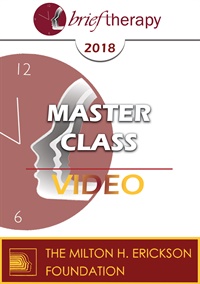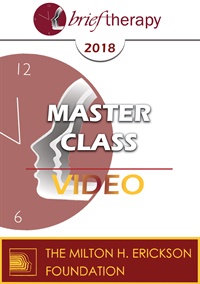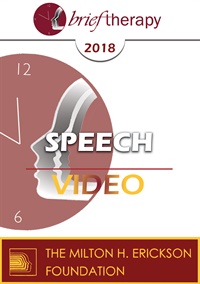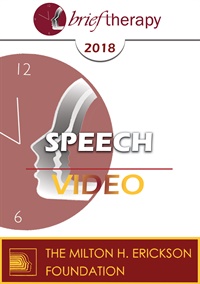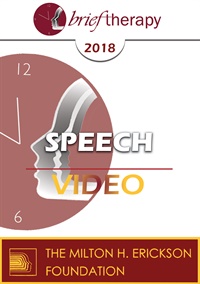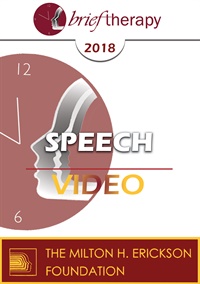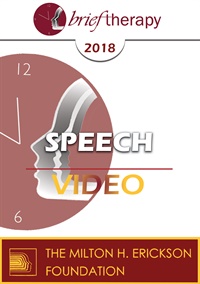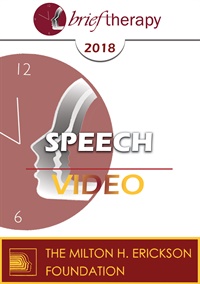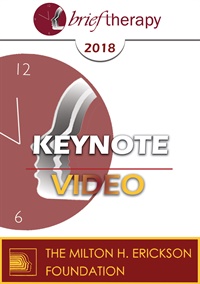- Average Rating:
- Not yet rated
- Topic Areas:
- Master Classes | Hypnosis | Psychotherapy | Ericksonian Hypnosis and Therapy Techniques | Strategic Therapy | Ericksonian Psychotherapy | Experiential Therapy | Hypnotherapy
- Categories:
- Brief Therapy Conference | Brief Therapy Conference 2018
- Faculty:
- Michael Yapko, PhD | Jeffrey Zeig, PhD
- Course Levels:
- Master Degree or Higher in Health-Related Field
- Duration:
- 2:56:13
- Format:
- Audio and Video
- Original Program Date:
- Dec 10, 2018
- Short Description:
- Ericksonian hypnotherapy and strategic approaches promote experiential methods of change. In combination they can be synergistic. Psychotherapy is best when clients have the experience of an alive, goal-oriented therapeutic process. Such dynamic empowering experiences pave the way for new understandings and growth-oriented possibilities. Drs. Yapko and Zeig will engage with each other and the participants to examine commonalities and differences in their work. The Master Class centers on providing then deconstructing demonstrations of Ericksonian Psychotherapy and Hypnosis, providing a unique opportunity for in-depth learning.
- Price:
-
Sale is $29.00
price reduced from Base Price - $59.00
- Average Rating:
- Not yet rated
- Topic Areas:
- Master Classes | Hypnosis | Psychotherapy | Ericksonian Hypnosis and Therapy Techniques | Ericksonian Psychotherapy | Experiential Therapy | Hypnotherapy
- Categories:
- Brief Therapy Conference | Brief Therapy Conference 2018
- Faculty:
- Michael Yapko, PhD | Jeffrey Zeig, PhD
- Course Levels:
- Master Degree or Higher in Health-Related Field
- Duration:
- 2:43:33
- Format:
- Audio and Video
- Original Program Date:
- Dec 10, 2018
- Short Description:
- Ericksonian hypnotherapy and strategic approaches promote experiential methods of change. In combination they can be synergistic. Psychotherapy is best when clients have the experience of an alive, goal-oriented therapeutic process. Such dynamic empowering experiences pave the way for new understandings and growth-oriented possibilities. Drs. Yapko and Zeig will engage with each other and the participants to examine commonalities and differences in their work. The Master Class centers on providing then deconstructing demonstrations of Ericksonian Psychotherapy and Hypnosis, providing a unique opportunity for in-depth learning.
- Price:
-
Sale is $29.00
price reduced from Base Price - $59.00
Credit available - Click Here for more information
- Average Rating:
- Not yet rated
- Topic Areas:
- Speeches | Mindfulness | Narcissism | Brief Therapy | Self-Esteem
- Categories:
- Brief Therapy Conference | Brief Therapy Conference 2018 | Online Continuing Education
- Faculty:
- Ronald Siegel, PsyD
- Course Levels:
- Master Degree or Higher in Health-Related Field
- Duration:
- 1:00:31
- Format:
- Audio and Video
- Original Program Date:
- Dec 09, 2018
- Short Description:
- What if our therapeutic goals of improving self-esteem, developing a stable and coherent sense of self, and expressing our authentic feelings all turn out to be misguided? What if they inadvertently feed the cultural enthusiasm for celebrity and success that makes so many of us miserable? This presentation will examine how mindfulness practices can be harnessed in psychotherapy to reexamine our conventional sense of self, leading both us and our clients toward greater well-being, wisdom, and compassion.
- Price:
-
Sale is $29.00
price reduced from Base Price - $59.00
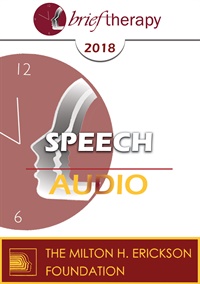
- Average Rating:
- Not yet rated
- Topic Areas:
- Speeches | Marriage | Sex and Sexuality | Brief Therapy | Couples Therapy | Communication | Gender Dynamics
- Categories:
- Brief Therapy Conference | Brief Therapy Conference 2018 | Pioneers in Couples and Family Therapy
- Faculty:
- Michele Weiner-Davis, LCSW
- Duration:
- 38:54
- Format:
- Audio Only
- Original Program Date:
- Dec 09, 2018
- Short Description:
- This session addresses the challenge of mismatched sexual desire, a dynamic that affects one in three couples and can erode both physical and emotional intimacy. It outlines a three-part model: helping the lower-desire partner build empathy, encouraging acts of “real giving” to increase mutual care, and educating couples on the human sexual response cycle. The presentation guides therapists in facilitating open, collaborative conversations to rekindle emotional and sexual connection.
- Price:
- $15.00 - Base Price
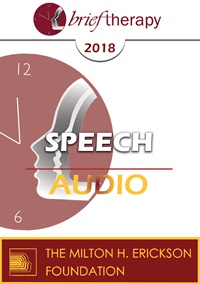
- Average Rating:
- Not yet rated
- Topic Areas:
- Speeches | Multicultural | Strategic Therapy | Brief Therapy | Strengths-Based
- Categories:
- Brief Therapy Conference | Brief Therapy Conference 2018
- Faculty:
- Terry Soo-Hoo, PhD
- Duration:
- 1:42:11
- Format:
- Audio Only
- Original Program Date:
- Dec 09, 2018
- Short Description:
- The Culturally Sensitive Strength-Based Strategic Therapy method was developed to integrate various principles founded by the Mental Research Institute (MRI) and Jay Haley’s Strategic Therapy approach as well as other methods to address these issues. In this workshop, guidelines will be presented for learning the principles of Culturally Sensitive Strength-Based Strategic Therapy. There will be an emphasis on effective strategies in working within the cultural context of the client and how this is critical to successful therapy. A structure will be presented for organizing the specific tasks and skills involved in different aspects of the method including activating the client’s strengths. Case examples, some on video recordings, will illustrate many innovative brief therapy techniques.
- Price:
- $15.00 - Base Price
Credit available - Click Here for more information
- Average Rating:
- Not yet rated
- Topic Areas:
- Speeches | Trauma | Brief Therapy | Future Oriented | Post-Traumatic Stress Disorder (PTSD)
- Categories:
- Brief Therapy Conference | Brief Therapy Conference 2018 | Online Continuing Education
- Faculty:
- Bill O'Hanlon, MS
- Course Levels:
- Master Degree or Higher in Health-Related Field
- Duration:
- 57:49
- Format:
- Audio and Video
- Original Program Date:
- Dec 09, 2018
- Short Description:
- People with post-traumatic stress often suffer for years and develop a variety of troubling and often crippling problems. This talk will detail a philosophy and methods of working briefly and effectively with people who have been traumatized. An array of new methods have shown that previous conceptions and methods of working with trauma are unnecessarily long-term and re-traumatizing. These new approaches, rather than being based on the past and deterministic models, are oriented towards the present and future and a sense of possibilities. You will leave equipped with a different understanding of how to treat trauma and four specific methods you can use right away in your work.
- Price:
-
Sale is $29.00
price reduced from Base Price - $59.00
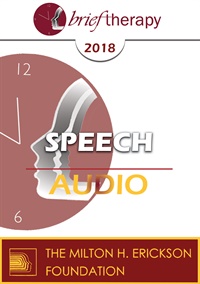
- Average Rating:
- Not yet rated
- Topic Areas:
- Speeches | Trauma | Neurobiology | Neuroscience | Research | Addiction | Memory
- Categories:
- Brief Therapy Conference | Brief Therapy Conference 2018 | Pioneers in Couples and Family Therapy
- Faculty:
- Janina Fisher, PhD
- Duration:
- 1:05:26
- Format:
- Audio Only
- Original Program Date:
- Dec 09, 2018
- Short Description:
- Janina Fisher explores how traumatic memories continue to impact individuals through persistent symptoms like depression and anxiety. She introduces the concept of implicit memory, explaining how emotional and visceral memories shape current behavior. Fisher offers practical techniques for helping clients understand their trauma responses, emphasizing a transformational approach that focuses on healing and creating new experiences rather than reliving past events.
- Price:
- $15.00 - Base Price
Credit available - Click Here for more information
- Average Rating:
- Not yet rated
- Topic Areas:
- Speeches | Obsessive Compulsive Disorder (OCD) | Brief Therapy
- Categories:
- Brief Therapy Conference | Brief Therapy Conference 2018 | Online Continuing Education
- Faculty:
- Reid Wilson, PhD
- Course Levels:
- Master Degree or Higher in Health-Related Field
- Duration:
- 1:01:32
- Format:
- Audio and Video
- Original Program Date:
- Dec 09, 2018
- Short Description:
- The rigid beliefs and bizarre behavior of clients with obsessive-compulsive disorder (OCD) can seem intimidating to any therapist. But if you look under the hood, the driving force of this dominant disorder is always the same: something could go terribly wrong and it will be your fault. Treatment can be difficult, but it is not complex. Participants will learn the core strategies of treatment and the primary tactics to confront client resistance.
- Price:
-
Sale is $29.00
price reduced from Base Price - $59.00
Credit available - Click Here for more information
- Average Rating:
- Not yet rated
- Topic Areas:
- Speeches | Belief Systems | Brief Therapy | Neuroscience
- Categories:
- Brief Therapy Conference | Brief Therapy Conference 2018 | Online Continuing Education
- Faculty:
- Robert Dilts, BA
- Course Levels:
- Master Degree or Higher in Health-Related Field
- Duration:
- 1:01:49
- Format:
- Audio and Video
- Original Program Date:
- Dec 09, 2018
- Short Description:
- ]Managing the process of change involves working with a number of levels of key factors. These factors include our environment (where and when we act), our behavior (what we do), our capabilities (how we think and plan), our values and beliefs (why we think and act the way we do), and our identity (who we perceive ourselves to be) and our sense of purpose (for whom and for what we dedicate ourselves). The presentation will explore the relevance of these different levels of influence to brief therapy and how they may be identified and addressed to help clients reach their therapeutic goals.
- Price:
-
Sale is $29.00
price reduced from Base Price - $59.00
Credit available - Click Here for more information
- Average Rating:
- Not yet rated
- Topic Areas:
- Speeches | Brief Therapy | Neuroscience | Psychotherapy | Therapist Development
- Categories:
- Brief Therapy Conference | Brief Therapy Conference 2018 | Online Continuing Education
- Faculty:
- Michael Yapko, PhD
- Course Levels:
- Master Degree or Higher in Health-Related Field
- Duration:
- 1:02:31
- Format:
- Audio and Video
- Original Program Date:
- Dec 09, 2018
- Short Description:
- Conventional wisdom can guide us but also confuse us when seemingly good pieces of advice contradict each other (e.g., “Look before you leap…BUT he who hesitates is lost”). How can someone know when to do this rather than do that? How can we help clients make better decisions in order to improve the quality of their lives? The fields of cognitive neuroscience and phenomenology have offered us many insights into decision-making processes and some of these will be discussed as they apply to the context of active, short-term psychotherapies.
- Price:
-
Sale is $29.00
price reduced from Base Price - $59.00
Credit available - Click Here for more information
- Average Rating:
- Not yet rated
- Topic Areas:
- Speeches | Children and Adolescent Therapy | Art and Creativity | Brief Therapy | Family Therapy | Anxiety | Depression | Goals of the Therapist
- Categories:
- Brief Therapy Conference | Brief Therapy Conference 2018 | Online Continuing Education
- Faculty:
- Lynn Lyons, LICSW
- Course Levels:
- Master Degree or Higher in Health-Related Field
- Duration:
- 1:02:45
- Format:
- Audio and Video
- Original Program Date:
- Dec 09, 2018
- Short Description:
- We don't often think of creativity and problem solving as equal partners in therapy with children. But when struggling families arrive at your office, it is the immediate blending of these two components that allows you and the family to move quickly from overwhelmed to engaged, confused to targeted. Based on 29 years of successes and failures, this speech will offer ideas to immediately connect with families, help them untangle the tired messiness they often arrive with, and create active interventions that build momentum, create new patterns, and offer hope.
- Price:
-
Sale is $29.00
price reduced from Base Price - $59.00
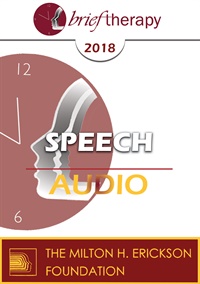
- Average Rating:
- Not yet rated
- Topic Areas:
- Speeches | Brief Therapy | Trauma | Anxiety | Hypnosis | Pain and Healing | Dissociation
- Categories:
- Brief Therapy Conference | Brief Therapy Conference 2018
- Faculty:
- Camillo Loriedo, MD, PhD
- Duration:
- 1:00:42
- Format:
- Audio Only
- Original Program Date:
- Dec 09, 2018
- Short Description:
- Dissociative hypnotic intervention demonstrated to be very useful in treating pain, anxiety disorders and many other conditions. But hypnosis can as well reactivate the natural mind processes, contributing to reconnect different parts (distinct modes of information processing) into a functional and unified self, particularly after traumatic experiences. Rapport, the special relationship that produces intense interpersonal links and connections, as well as profound disconnections with non-hypnotic reality, can be considered a crucial factor of brief therapeutic approach to dissociative conditions and trauma. How to use rapport as well as other new specific therapeutic interventions to reestablish the natural integrative links in a dissociative mind and relationship will be outlined in this presentation.
- Price:
- $15.00 - Base Price
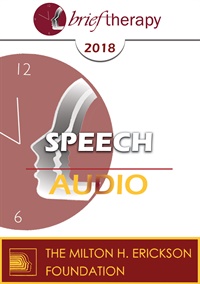
- Average Rating:
- Not yet rated
- Topic Areas:
- Speeches | Brief Therapy | Psychotherapy | Solution Oriented Approach
- Categories:
- Brief Therapy Conference | Brief Therapy Conference 2018
- Faculty:
- Elliott Connie, MA, LPC
- Duration:
- 59:30
- Format:
- Audio Only
- Original Program Date:
- Dec 09, 2018
- Short Description:
- The Solution Focused Approach is a widely accepted way of conducted psychotherapy sessions. Over the past 40 years this approach has come to be known for its brevity, pragmatism and positive stance. However, many inaccurate myths about this approach exist which impact many clinicians' ability to understand, and subsequently use, this approach. There is one misunderstanding that stands above all others, and this workshop will directly address this common misunderstanding while showing to not succumb to this idea and how to follow the true essence of Solution Focused work.
- Price:
- $15.00 - Base Price
Credit available - Click Here for more information
- Average Rating:
- Not yet rated
- Topic Areas:
- Speeches | Psychotherapy | Art and Creativity | Brief Therapy | Resources
- Categories:
- Brief Therapy Conference | Brief Therapy Conference 2018 | Online Continuing Education
- Faculty:
- Stephen Gilligan, PhD
- Course Levels:
- Master Degree or Higher in Health-Related Field
- Duration:
- 1:01:12
- Format:
- Audio and Video
- Original Program Date:
- Dec 09, 2018
- Short Description:
- Therapy is successful when clients are able to experience significantly changed realities. While the identification and transformation of symptoms is important in this regard, the activation of the client's creative capacity to make positive changes is even more important. This paper will explore how the 6-step model of Generative Psychotherapy provides a disciplined yet flexible process for helping clients claim and use their agency for creative change.
- Price:
-
Sale is $29.00
price reduced from Base Price - $59.00
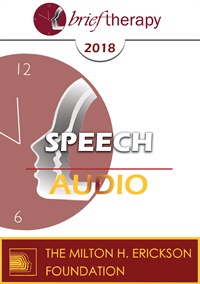
- Average Rating:
- Not yet rated
- Topic Areas:
- Speeches | Brief Therapy | Couples Therapy | Therapist Development | Relationships
- Categories:
- Brief Therapy Conference | Brief Therapy Conference 2018 | Pioneers in Couples and Family Therapy
- Faculty:
- Stan Tatkin, PsyD, MFT
- Duration:
- 1:11:45
- Format:
- Audio Only
- Original Program Date:
- Dec 09, 2018
- Short Description:
- This one-hour speech focuses on what all couple therapists should at least consider: social justice and fairness agreements between partners. The human primate is warlike, self-centered, mostly automatic, and given to flights of fancy, moodiness, and other unpredictable feelings, thoughts, and behaviors. Thus, the social science predicate of civilization dictates that, to hold human beings accountable, there must be agreements between individuals that protect them from one another.
- Price:
- $15.00 - Base Price
Credit available - Click Here for more information
- Average Rating:
- Not yet rated
- Topic Areas:
- Keynotes | Anxiety | Brief Therapy | Cognitive Behavior Therapy (CBT) | Depression
- Categories:
- Brief Therapy Conference | Brief Therapy Conference 2018 | Online Continuing Education
- Faculty:
- David Burns, MD
- Course Levels:
- Master Degree or Higher in Health-Related Field
- Duration:
- 1:00:36
- Format:
- Audio and Video
- Original Program Date:
- Dec 09, 2018
- Short Description:
- Dr. Burns will describe powerful new TEAM-CBT techniques that can greatly accelerate recovery from depression and anxiety disorders. He will bring these tools with life with dramatic video excerpts from a therapy session with a mental health professional who had been struggling with years of intense anxiety, depression, and guilt.
- Price:
-
Sale is $29.00
price reduced from Base Price - $59.00
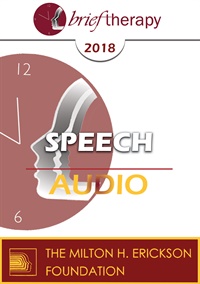
- Average Rating:
- Not yet rated
- Topic Areas:
- Speeches | Brief Therapy | Ericksonian Hypnosis and Therapy Techniques | Therapist Development
- Categories:
- Brief Therapy Conference | Brief Therapy Conference 2018
- Faculty:
- Jeffrey Zeig, PhD
- Duration:
- 1:00:38
- Format:
- Audio Only
- Original Program Date:
- Dec 09, 2018
- Short Description:
- One way of modeling Milton Erickson is to consider the states that he commonly inhabited when he was conducting psychotherapy. Erickson "states" will be described and examples will be provided.
- Price:
- $15.00 - Base Price
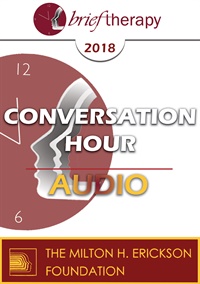
- Average Rating:
- Not yet rated
- Topic Areas:
- Great Conversations | Anxiety | Brief Therapy
- Categories:
- Brief Therapy Conference | Brief Therapy Conference 2018
- Faculty:
- Bill O'Hanlon, MS | Reid Wilson, PhD
- Duration:
- 1:01:40
- Format:
- Audio Only
- Original Program Date:
- Dec 08, 2018
- Short Description:
- Compare and contrast complementary perspectives on the theory and practice of working with anxiety disorders.
- Price:
- $15.00 - Base Price
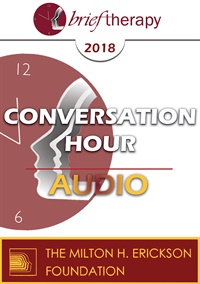
- Average Rating:
- Not yet rated
- Topic Areas:
- Great Conversations | Children and Adolescent Therapy | Family Therapy | Trauma | Brief Therapy | Post-Traumatic Stress Disorder (PTSD)
- Categories:
- Brief Therapy Conference | Brief Therapy Conference 2018
- Faculty:
- Camillo Loriedo, MD, PhD | Lynn Lyons, LICSW
- Duration:
- 1:00:58
- Format:
- Audio Only
- Original Program Date:
- Dec 08, 2018
- Short Description:
- Trauma does not only affect individuals; it effects families. Systemic perspectives on the sequel to trauma will be presented.
- Price:
- $15.00 - Base Price
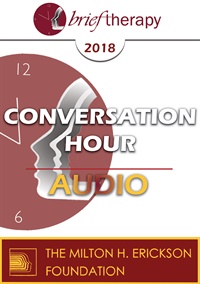
- Average Rating:
- Not yet rated
- Topic Areas:
- Great Conversations | Phobia | Brief Therapy
- Categories:
- Brief Therapy Conference | Brief Therapy Conference 2018
- Faculty:
- Robert Dilts, BA | Jeffrey Zeig, PhD
- Duration:
- 59:18
- Format:
- Audio Only
- Original Program Date:
- Dec 08, 2018
- Short Description:
- Technical and theoretical approaches to working with phobias will be described from complementary perspectives.
- Price:
- $15.00 - Base Price
Tags: Brief Therapy Phobias
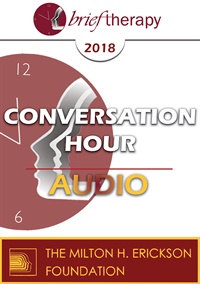
- Average Rating:
- Not yet rated
- Topic Areas:
- Great Conversations | Depression | Brief Therapy | Cognitive Behavior Therapy (CBT) | Couples Therapy | Resilience | Strategic Therapy | Therapist Development | Therapy Practice
- Categories:
- Brief Therapy Conference | Brief Therapy Conference 2018 | Pioneers in Couples and Family Therapy
- Faculty:
- Judith Beck, PhD | Michele Weiner-Davis, LCSW
- Duration:
- 59:10
- Format:
- Audio Only
- Original Program Date:
- Dec 08, 2018
- Short Description:
- This conversation explores CBT-informed approaches to depression, emphasizing behavioral activation, therapeutic alliance, and clinical flexibility. Beck and Weiner-Davis discuss how hope, core beliefs, and relational support shape recovery, while also addressing medication, family inclusion, and the value of comprehensive evaluation.
- Price:
- $15.00 - Base Price
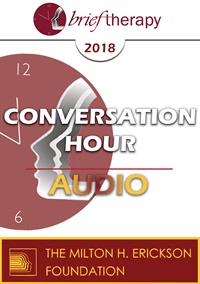
- Average Rating:
- Not yet rated
- Topic Areas:
- Great Conversations | Hypnosis | Mindfulness | Brief Therapy
- Categories:
- Brief Therapy Conference | Brief Therapy Conference 2018
- Faculty:
- Ronald Siegel, PsyD | Michael Yapko, PhD
- Duration:
- 1:00:08
- Format:
- Audio Only
- Original Program Date:
- Dec 08, 2018
- Short Description:
- Compare and contrast mindfulness and hypnosis. Understanding differences and similarities. Indications for using each approach.
- Price:
- $15.00 - Base Price
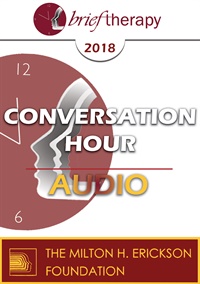
- Average Rating:
- Not yet rated
- Topic Areas:
- Great Conversations | Anxiety | Depression | Research | Training | Brief Therapy
- Categories:
- Brief Therapy Conference | Brief Therapy Conference 2018
- Faculty:
- Stephen Gilligan, PhD | Scott Miller, PhD
- Duration:
- 1:05:12
- Format:
- Audio Only
- Original Program Date:
- Dec 08, 2018
- Short Description:
- Therapists need theoretical and technical constructs, including those that are empirically based. Therapists need to understand how to create a comprehensive treatment plan.
- Price:
- $15.00 - Base Price
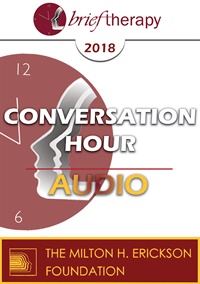
- Average Rating:
- Not yet rated
- Topic Areas:
- Great Conversations | Multicultural | Brief Therapy | Treatment Planning
- Categories:
- Brief Therapy Conference | Brief Therapy Conference 2018
- Faculty:
- Laura Brown, PhD | Elliott Connie, MA, LPC
- Duration:
- 1:05:53
- Format:
- Audio Only
- Original Program Date:
- Dec 08, 2018
- Short Description:
- Contemporary therapist need to understand culturally competent practice. Principles of assessment and treatment will be offered.
- Price:
- $15.00 - Base Price
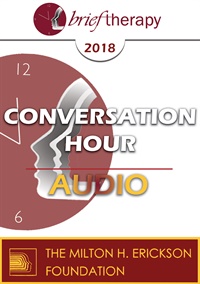
- Average Rating:
- Not yet rated
- Topic Areas:
- Great Conversations | Habits | Brief Therapy | Treatment Planning
- Categories:
- Brief Therapy Conference | Brief Therapy Conference 2018
- Faculty:
- David Burns, MD | Jeffrey Zeig, PhD
- Duration:
- 56:53
- Format:
- Audio Only
- Original Program Date:
- Dec 08, 2018
- Short Description:
- The mechanics of assessment and treatment planning for working with habits and addictions including relevant research findings.
- Price:
- $15.00 - Base Price


